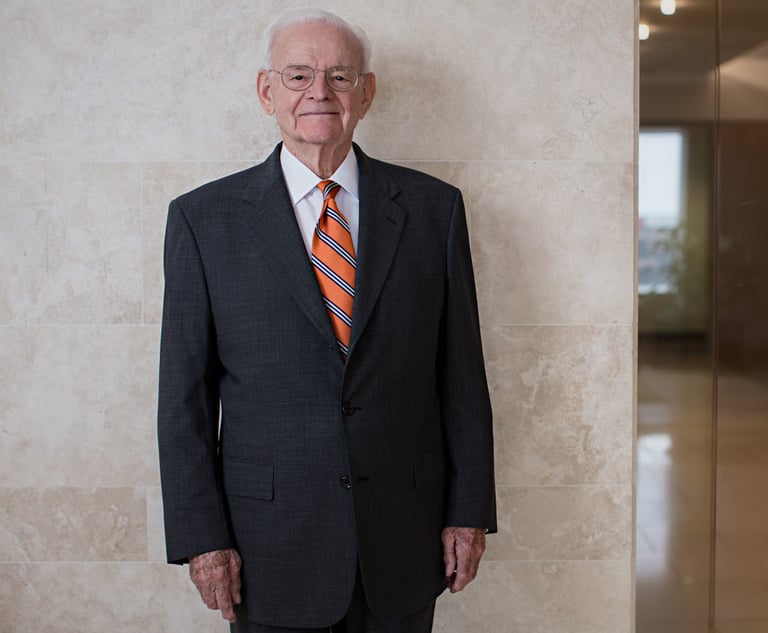 Saul Ewing Arnstein & Lehr in Miami.
Saul Ewing Arnstein & Lehr in Miami.Saul Ewing Sees Profits Grow in Integration Year
Revenue per lawyer and profits per equity partner both rose in the year after a merger with Arnstein & Lehr.
February 20, 2019 at 03:56 PM
4 minute read
In its first full year after a major merger, Saul Ewing Arnstein & Lehr posted increases in both revenue per lawyer (RPL) and profits per equity partner (PEP), beating firm leadership's expectations.
The firm saw gross revenue increase by 3.6 percent, to $227.3 million. But RPL climbed by 6.5 percent to $623,000, recovering from a dip in 2017, when head count grew by nearly 50 percent.
Saul Ewing announced in September 2017 that it had merged with Arnstein & Lehr, adding more than 100 lawyers in Chicago and Florida to the Philadelphia-based Am Law 200 firm.
According to managing partner Barry Levin, Saul Ewing beat its budget by 18 percent in 2018. “It was a great year,” he said.
PEP increased by 8.5 percent to $602,000 in 2018, also surpassing 2016 levels after a slide in 2017. Net income, at $70.9 million, showed a 9.5 percent increase.
With a head count of 365, Saul Ewing had 10 fewer lawyers in 2018 than in 2017, showing a decrease of 2.7 percent. Much of the contraction came in the nonequity partner tier, which shrank by six, to 84 nonequity partners. The number of nonpartner lawyers decreased as well, while the equity partner tier grew by one.
 “On the heels of a merger, it's not unusual to have some consolidation,” Levin said. Some of the lawyers who left the firm retired, he said, and some went in-house with clients. According to Levin, there was just one lawyer who cited the merger as a reason for leaving, but that person departed in 2017.
“On the heels of a merger, it's not unusual to have some consolidation,” Levin said. Some of the lawyers who left the firm retired, he said, and some went in-house with clients. According to Levin, there was just one lawyer who cited the merger as a reason for leaving, but that person departed in 2017.
Certain practices were especially strong, including higher education and insurance, Levin said, as well as litigation in general, and real estate. The higher education group, he said, “is one of our top revenue drivers in the firm.” That work includes litigation and regulatory counseling, with some of the firm's larger clients based in Pennsylvania, he said.
Other significant litigation work included representing Castle Hill Gaming in a trademark case in Oklahoma, and representing Delta Chemical Corp. in a multidistrict litigation, Levin said. Real estate engagements included work in New Jersey and Florida for Property Markets Group, as well as Drexel University's Schuylkill Yards project. And the firm handled a bankruptcy case for Singapore-based Ezra Holdings.
Saul Ewing raised rates “modestly” in 2018, Levin said, noting that its hourly rate remains competitive. But the firm has also aimed to emphasize its project management team, he said, which is increasingly involved in client relationships—Steven Flaks, Saul Ewing's director of pricing and project management, often attends client meetings, he said.
“It's absolutely a significant part of our business model now,” Levin said. While the “vast majority of work is still billed hourly,” he said, “more billing is tied to budgets.”
The focus on efficiency has resulted in better realization, he said, which was “well into the 90s” in 2018.
Another major focus for 2018, Levin said, was continuing to integrate lawyers throughout the firm, which added on large groups in Chicago and Florida in September 2017. The firm also prepared for an entrance to the Minneapolis market, which came to fruition this year.
From a financial perspective, that integration has involved evening out compensation. After two partner compensation cycles, Levin said, the firm has now integrated the two bands of partner pay that had existed between the two firms pre-merger.
“Having a productive, strong year makes that easier,” he said.
The firm is still working on “harmonizing” associate salaries, Levin said, which is part of why Saul Ewing did not implement firmwide associate raises after other large firms did so starting last summer.
As for its plans for the rest of 2019, Levin said the firm will aim to grow within its current footprint. He said he has noticed increased interest from lawyers seeking to join Saul Ewing since the 2017 merger.
But no additional mergers are on the immediate horizon, he said.
|Read More
Saul Ewing Increases 2017 Revenue 43 Percent After Big Merger
This content has been archived. It is available through our partners, LexisNexis® and Bloomberg Law.
To view this content, please continue to their sites.
Not a Lexis Subscriber?
Subscribe Now
Not a Bloomberg Law Subscriber?
Subscribe Now
NOT FOR REPRINT
© 2025 ALM Global, LLC, All Rights Reserved. Request academic re-use from www.copyright.com. All other uses, submit a request to [email protected]. For more information visit Asset & Logo Licensing.
You Might Like
View All
Judge Louis C. Bechtle: An American Jurist Who Relied on Common Sense, Sound Judgment and Fairness
5 minute read
Six Ways Thought Leadership Can Support Your Law Firm’s 2025 Strategic Plan
6 minute read
Trending Stories
- 1Sidley Cross-Border Transactions Partner Heads to Winston & Strawn
- 2Another Latham Partner Exits for Sidley
- 3Clark Hill Adds Franchise Law Group to Growing Atlanta Office
- 4DLA Piper Adds Former Verizon GC Amid In-House Hiring Spree
- 5'I Couldn't Believe It': Attorney Jim Walden Petitions US Court for Right to Run for NYC Mayor as an Independent
Who Got The Work
Michael G. Bongiorno, Andrew Scott Dulberg and Elizabeth E. Driscoll from Wilmer Cutler Pickering Hale and Dorr have stepped in to represent Symbotic Inc., an A.I.-enabled technology platform that focuses on increasing supply chain efficiency, and other defendants in a pending shareholder derivative lawsuit. The case, filed Oct. 2 in Massachusetts District Court by the Brown Law Firm on behalf of Stephen Austen, accuses certain officers and directors of misleading investors in regard to Symbotic's potential for margin growth by failing to disclose that the company was not equipped to timely deploy its systems or manage expenses through project delays. The case, assigned to U.S. District Judge Nathaniel M. Gorton, is 1:24-cv-12522, Austen v. Cohen et al.
Who Got The Work
Edmund Polubinski and Marie Killmond of Davis Polk & Wardwell have entered appearances for data platform software development company MongoDB and other defendants in a pending shareholder derivative lawsuit. The action, filed Oct. 7 in New York Southern District Court by the Brown Law Firm, accuses the company's directors and/or officers of falsely expressing confidence in the company’s restructuring of its sales incentive plan and downplaying the severity of decreases in its upfront commitments. The case is 1:24-cv-07594, Roy v. Ittycheria et al.
Who Got The Work
Amy O. Bruchs and Kurt F. Ellison of Michael Best & Friedrich have entered appearances for Epic Systems Corp. in a pending employment discrimination lawsuit. The suit was filed Sept. 7 in Wisconsin Western District Court by Levine Eisberner LLC and Siri & Glimstad on behalf of a project manager who claims that he was wrongfully terminated after applying for a religious exemption to the defendant's COVID-19 vaccine mandate. The case, assigned to U.S. Magistrate Judge Anita Marie Boor, is 3:24-cv-00630, Secker, Nathan v. Epic Systems Corporation.
Who Got The Work
David X. Sullivan, Thomas J. Finn and Gregory A. Hall from McCarter & English have entered appearances for Sunrun Installation Services in a pending civil rights lawsuit. The complaint was filed Sept. 4 in Connecticut District Court by attorney Robert M. Berke on behalf of former employee George Edward Steins, who was arrested and charged with employing an unregistered home improvement salesperson. The complaint alleges that had Sunrun informed the Connecticut Department of Consumer Protection that the plaintiff's employment had ended in 2017 and that he no longer held Sunrun's home improvement contractor license, he would not have been hit with charges, which were dismissed in May 2024. The case, assigned to U.S. District Judge Jeffrey A. Meyer, is 3:24-cv-01423, Steins v. Sunrun, Inc. et al.
Who Got The Work
Greenberg Traurig shareholder Joshua L. Raskin has entered an appearance for boohoo.com UK Ltd. in a pending patent infringement lawsuit. The suit, filed Sept. 3 in Texas Eastern District Court by Rozier Hardt McDonough on behalf of Alto Dynamics, asserts five patents related to an online shopping platform. The case, assigned to U.S. District Judge Rodney Gilstrap, is 2:24-cv-00719, Alto Dynamics, LLC v. boohoo.com UK Limited.
Featured Firms
Law Offices of Gary Martin Hays & Associates, P.C.
(470) 294-1674
Law Offices of Mark E. Salomone
(857) 444-6468
Smith & Hassler
(713) 739-1250






